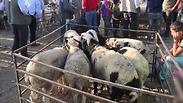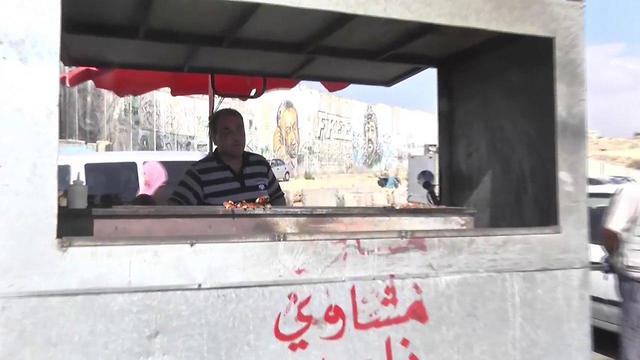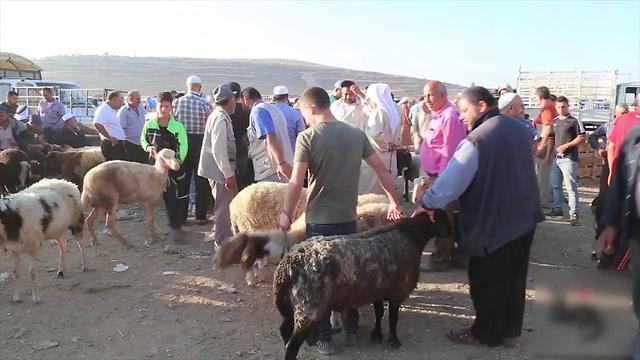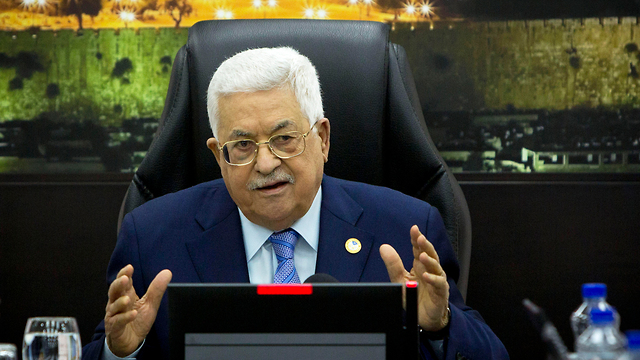
PA money woes make tense Eid al-Adha for West Bank Palestinians
Abbas' refusal to accept tax revenue from Israel is taking its toll on the local economy as civil servants see wages cut in half and even the annual festival devoted to food is failing to make an impact; 'our financial situation is tough, we are under siege from all directions,' says Hebron livestock merchant
RAMALLAH, West Bank - Money is the name of the game every year on the Muslim festival of Eid al-Adha, as Palestinians splash out on food for the annual four-day holiday, also known as the Festival of Sacrifice. But this year it plays a more critical role in light of the economic downturn experienced in the Palestinian Authority.
Palestinian President Mahmoud Abbas has refused to accept tax revenue collected for the PA by Israel in the past six months, as protest against Israel passing a law in July 2018 to deduct the amount of money that the PA gives to terrorists and their families from the tariffs Israel collects on their behalf.
The accumulated sum in the Treasury in Jerusalem already stands at NIS 3 billion, even as tens of thousands of PA officials are only receiving half of their salaries and the Palestinian economy faces collapse over the lack of money being spent in local businesses.
The Palestinian leadership had been doing everything it could in recent days to remind the public that this year's holiday, which traditionally includes multiple meals, would not be a happy one - and it looks like the message trickled down.
"As long as the political situation is difficult - so will be the economic situation", says Abed Malah, owner of a mobile kiosk that also serves as a cafe for laborers who are going to work in Israel through the Qalandia checkpoint between Jerusalem and the West Bank.

"We didn't buy any clothes or anything. Most people are in that situation," says Malah.
"There isn't any slaughter at the livestock market. No one is buying anything and even as the prices plummet – there are no buyers. In markets in Hebron and Nablus, for example, merchants offer extra low meat prices and still no one is buying," he says.
The special sheep market that opens for the holiday in Hebron has gained traction, but on a limited scale.
People have come to examine the goods, some with their children who are sure it is a petting zoo.
"The financial situation is very tough, we are under siege from all directions," says livestock merchant Ibrahim Abu Sabih.
"If someone cannot provide bread for their children – how are they going to get them meat for the holiday?"
Abu Sabih is quick to make clear, however, that his complaints are not aimed at the Palestinian leadership.
"We salute our president and government, who support the farmers, the merchants and the civilians," he says.
Sheep prices in the Palestinian market stand at NIS 65-75 per kilo, depending on the quality of the meat, and can even reach NIS 2,000 for a whole live sheep.
Only large families can afford to buy a whole sheep, as tradition requires, with the financial burden being shared among all.
Yet despite the economic turndown, Ramallah - the de facto capital of the Palestinian West Bank - is sizzling.
The main streets are teeming with life, new restaurants are opening and the amount of luxury cars on the roads is impressive - reflecting the imbalance between the middle class and the smaller, more prosperous echelon of Ramallah.
Even so, every Palestinian living in the West Bank is grateful for the fact that they are not in the collapsing Gaza Strip - where residents can only dream of reaching the current financial situation in Ramallah and Jenin, uncertain as it is.












